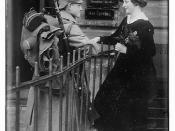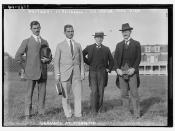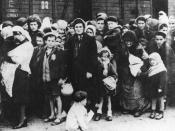Once it became clear that the war would not be a short one, Germany's industry was reorganized for a total mobilization. Between February 1942 and July 1944, armaments production increased threefold despite intense Allied bombing raids. Much of the labor for this increase came from the employment of some 7 million foreigners, taken from their homelands and forced to work under terrible conditions. Also contributing to the Nazi war effort was the systematic requisitioning of raw materials and food from occupied territories. As a result, Germans remained fairly well fed for most of the war, in contrast to the hunger endured during World War I.
Despite their comparative physical well-being until late in the war, it gradually became clear to many Germans that the regime's series of military triumphs had come to an end. Even the most intense, mendacious propaganda could not conceal that Germany's forces were being beaten back.
Sharing this growing awareness that defeat was likely, a group of military officers decided to assassinate Hitler. Although elements of the military had long opposed him, no one had acted to this point. During 1943 and 1944, the conspirators, who included many high-ranking officers and numerous prominent civilians, worked out elaborate plans for seizing power after the dictator's death. On June 20, 1944, the conspirators ignited a bomb that would probably have killed Hitler except for a stroke of bad luck--the misplacement of the device under a conference room table. The regime struck back and after months of reprisals had killed several thousand people, among them one field marshal and twenty-two generals. Several earlier attempts on Hitler's life had also failed. Because of these failures, it would be up to the Allies to remove Hitler and his regime from power.
Anti-Semitism was one of the Third Reich's most faithfully executed...


